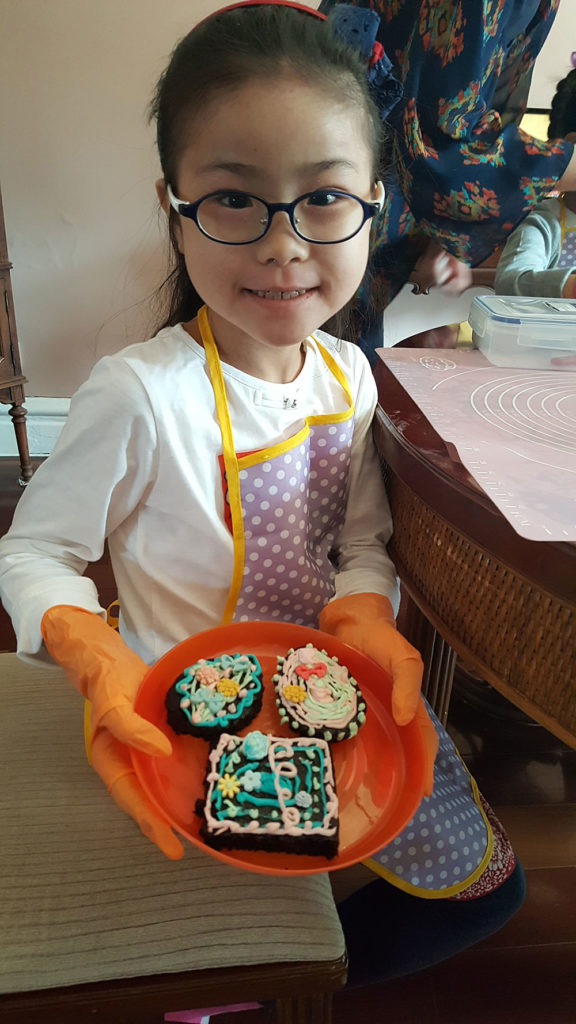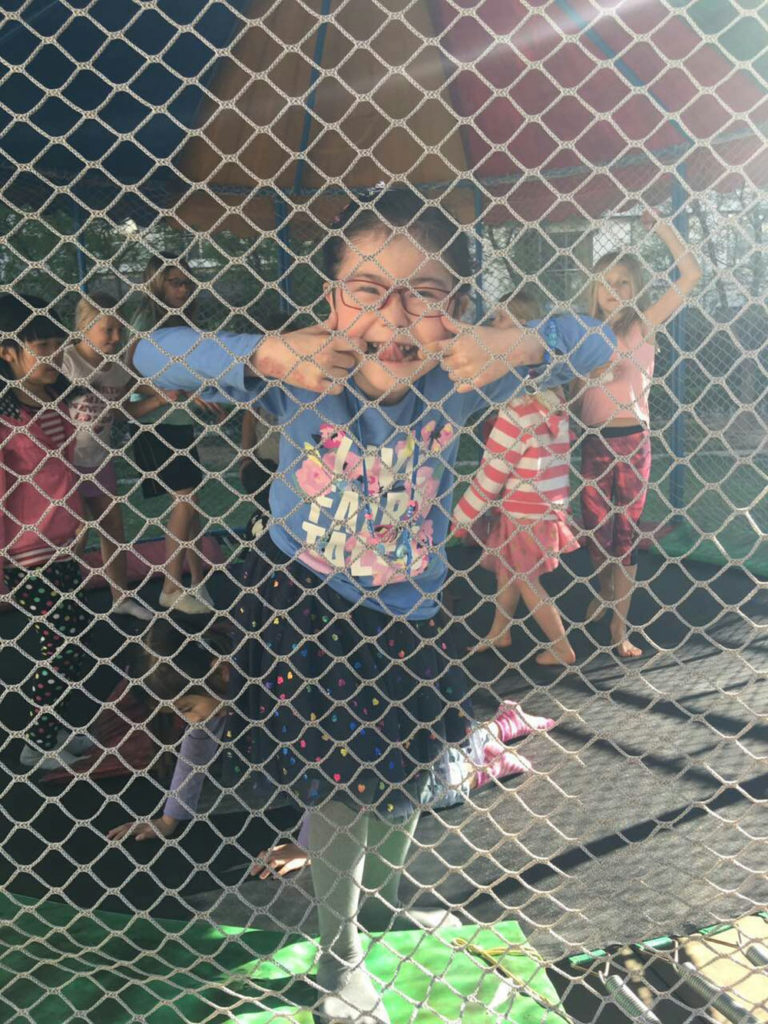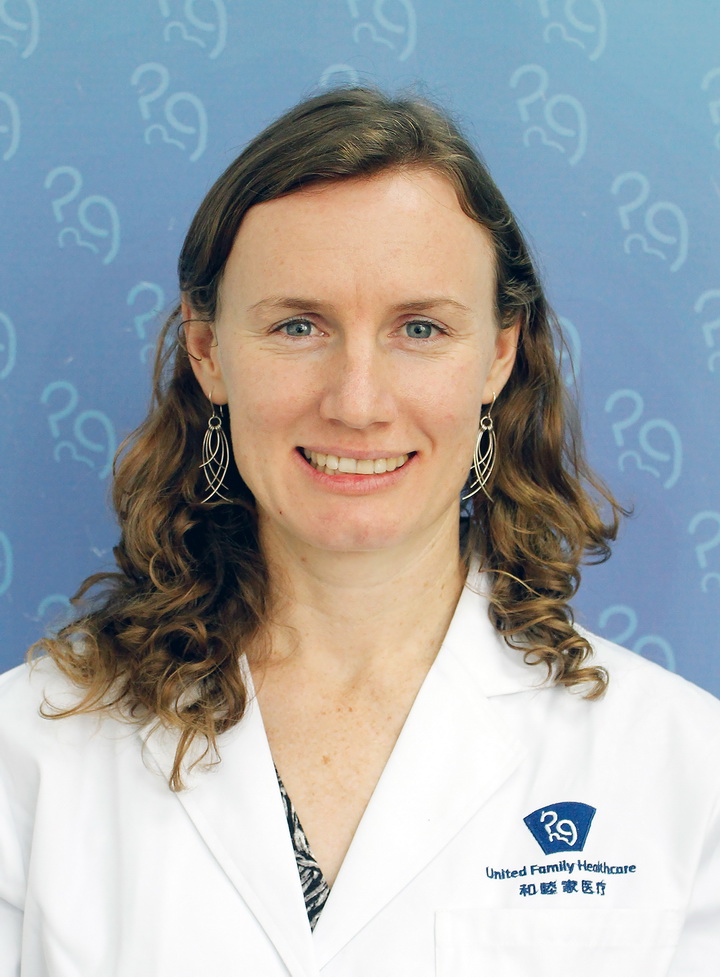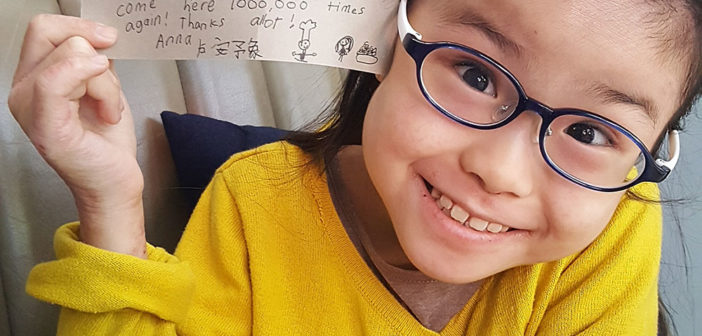
With the birth of their first child, parents can’t help dreaming about what lies ahead, about the things they will do as a family and that their child will accomplish. What happens to those dreams when you discover that your child’s life could be put at risk by everyday food and substances?
That was the journey traveled by Janice Chan and Lu Jin, when their daughter Anna was diagnosed with multiple severe allergies. We met with them to learn how they have not only coped, but raised a happy, active girl, and found reasons to be positive about their experiences.
“We first noticed when she was 2 months old,” Chan told us. “We were still in Hong Kong at the time. Rashes developed on her body, and we went to see several doctors. They said she was allergic to dairy products, then after blood tests, that she was also allergic to egg white.”
This was a problem when it came to finding a suitable formula.
“We changed from milk-based formula to a nutrition formula called Neocate. This was several years ago, and it was really hard to find that brand in China. We had to order it from overseas.
“Later, when Taobao came along, we could get it from there. But then the policies changed and a lot of tax was charged, so it became a problem again.”
If finding the right formula was a challenge, weaning presented even greater difficulties.
“We postponed all the food till she was one-year-old,” Lu said. “Then at the very beginning we only gave her very safe food like potatoes and broccoli.
“We went to see an allergist in Hong Kong, who did a lot of prick tests. It was quite painful for her. Then we found out there was a full list of things she couldn’t eat, that were dangerous, threatening to her life. Not only egg white and dairy, but nuts, of all kinds, all kinds of seafood, including seaweed, and some kinds of vegetables and fruit, like cranberries. She’s allergic to carrot and pumpkin, allergic to wheat – she develops rashes and has very itchy skin if she has too much wheat.
“She also reacts to elements of the environment, like dust, pollen, the catkins which are everywhere in spring… every time the weather changes she has a very bad time, with very itchy skin. And dust mites too. We have no carpet at home, and in school, we tell them she mustn’t sit on any carpets…”
Lu reeled off this list in a matter-of-fact way, but we had to take a moment to even imagine what it would be like to hear this news. We wondered whether they’re ever tempted just to put her in a bubble, to keep her safe.
“It’s a dilemma. If she stays in a bubble for too long, she won’t get better. Since she’s getting older, we’re trying to get her more healthy, to go outside to play as much as possible. She scratches a lot, and has wounds all over her body, so there’s not many kinds of activities she can do. She can’t even swim because of the chlorine in the water. We’re always looking for activities to get out of the household.”

They soon learned, in the most dramatic way possible, what could happen if they weren’t constantly vigilant.
“When she was two years old, we accidentally gave her a piece of biscuit. She only took one bite, then after a few minutes developed hives all over her body. We didn’t have medication at home apart from antihistamine, so we gave her a triple dose and went to see the doctor immediately. It was very frightening, her first serious reaction. From that moment onward we were extremely careful.”
Of course the environment in Beijing presents particular challenges.
“Even without air pollution already her outdoor activities are very limited. We have to keep monitoring it all the time, or she gets sick. We have a stricter limit; for us if the AQI is higher than 180 we keep her indoors. At home we have an air filter, but there isn’t much more we can do – we can’t change the air! We just try to take advantage of nice weather, and holiday away from Beijing.
“We’ve been thinking about moving for a while, but there are multiple factors to consider: not only the physical environment, but also school, work, and other things. We’re trying to adapt to this environment, this city of Beijing where people don’t have a lot of awareness of this issue. In fact most people don’t even think this is an issue. They think it’s like ‘when I eat seafood, I get a red spot.’ They won’t think of it as a life-threatening thing, that affects us a lot in our daily lives.”
Chan and Lu see a significant difference between the west and China when it comes to levels of awareness.
“We’ve traveled to a few different countries,” Chan said, “and definitely in western countries like the UK, Australia, and in Europe, they have better knowledge about this. Most recently, we brought Anna to lunch at a restaurant, a very nice restaurant in China World Mall. As we sat ordering we discovered it was the one and only time we forgot to bring lunch for her – I have to cook at home and bring food out to the restaurant. We tried to talk to the restaurant staff, and said ‘can you talk to the chef, and just use pork, vegetables, salt, and nothing else – just cook a simple dish?’ They said ‘Sorry, we can’t do that. We have our recipe, our reputation, we cannot change what we offer.’ So we had to change our plan and go home earlier.
“At Chinese New Year we traveled to London. We were visiting a museum, and ordering coffee. To my big surprise the staff asked if we were allergic to anything!”
And it’s not only in restaurants that they’ve noticed a difference.
“In Anna’s school there are westerners and also local children. We found westerners are more accepting, and more open to this kind of thing. If they have a playdate at their home or a birthday party, they will take the initiative to ask what they can prepare, and pay attention to what she can play or not play.
“Local parents though may not invite my kid! They’re scared, not sure how to handle it. They discuss it among themselves, but don’t talk to me. I can feel the difference.”
The reasons for this are complex, they suggested.
“In western countries people are more open to talk about themselves, about food and things they can and can’t eat,” Chan said, and Lu added that it’s related to the living standards of the country.
“Although we keep talking about being the second largest economy, China is still a developing country. The main concern is still diseases; medicine isn’t at an advanced level like the west. Even with doctors, a lack of awareness exists. I’ve been taking Anna to see a TCM [Traditional Chinese Medicine] doctor. She’s been seeing the doctor for almost a year, every two weeks, and they’ve been getting familiar with each other. Even so the doctor forgets what our child is allergic to. She prescribed a mixture of herbs which included macadamia nut. It was only when we received it, that we saw it contained nut. We called the doctor, and she said “Oh, yeah!”
We asked whether the TCM treatment was having an impact.
“It’s not really a yes or no question. Even the doctors admit that the treatment itself may not be directly helpful to the allergy, but it helps the whole body system. I would say yes, but slowly. She sleeps a little bit better, that’s what the doctor was expecting.”
Western medicine also cannot promise any miracle cures.
“Her immune system is hypersensitive,” Lu told us. “The eczema and anaphylaxis are reactions from her immune system. It’s hard to say whether she will get better or not, her reaction level is quite high. According to the doctors, even if she gets better, it will take lot longer than other kids who have a mild reaction. In the US they’re more advanced in research, they’re finding ways to help people. We’re keeping eye on that to see if there’s anything that can cure her.”
In the meantime the family have to find ways to manage her condition. For a child like Anna, even more so than for other children, the choice of school was critical.
“We went to see a few schools,” Chan said. “We didn’t try any pure local schools, but we visited one or two bilingual schools, and some international schools. We went to meet the principals, and the teachers; we tried to have a feeling about how they reacted, a sense of whether they knew what to do, and understood the challenges.
“Unfortunately most of them have no knowledge. For example, Anna has to bring her own lunch, but one teacher told me that if Anna was to attend their school she’d have to take school lunch. They said they have to be fair to every kid, even though I’d explained the dangers. It was very upsetting. Of course we didn’t choose that school, even though it’s a very famous international school that most parents love!
“When we came to Dulwich College Beijing (DCB) and met principal Sarah Humphries, it was a totally different experience. On the first day we met she was already very confident, telling us they would handle it, that they didn’t have much experience of the situation but they would handle it. We had meetings in advance with the teacher and the nurse.
“Some other schools have policies without any exception. There’s no flexibility, a lack of awareness and knowledge. They don’t realize how serious it is, that it could be life-threatening. DCB had a totally different response. They understood, they were accepting and open to discuss what kind of support the school could give.”
“When you go into school,” Lu added, “they have signs everywhere saying ‘we are a nut-free school.’ They are willing to make an effort for individual students.
“They are fully aware that we want Anna to be like all the other kids. They make arrangements so she can participate freely and safely. We are very lucky that over the past four years everything has gone pretty smoothly.”
Their strong relationship with the school is a factor helping them overcome the challenges, and as Lu told us, they try to deal with the situation in a positive way.
“We don’t want her to live scared and worried all the time, we want to see her growing up like any other kid. We do preparation as preventive measure.
“We try to travel, but it’s not easy, it’s like moving house. Two years ago in the summer we took her to Legoland, and we had three or four big bags all full of kids’ stuff: clothing, frozen food, and so on.
“We want people around her to see her just as everyone else, so she won’t feel she’s being singled out or left behind. It’s not only a physical challenge but a mental one. It’s helpful that her life is becoming more normal, she’s becoming stronger overall. Many doctors say she might outgrow it in time.”
Anna is now eight years old, and as she grows the challenges change too.
“She has more questions,” Chan said, “she cares more about how people see her, about her social life. When she was small she felt OK with her own food, but now she makes comments like ‘I really wish I didn’t have allergies so I could eat what I like.’ The challenge is how to prepare her to self-advocate, to be stronger in her heart.
“We try to eat similar things, because it doesn’t matter to us. I try to cook something Anna can eat so we can all eat together. We spend a lot of time exploring different kinds of food so we can have variety. When we went to hotels in Macau and London, where the restaurants can cook something for her like grilled vegetables she was so happy. It means a lot to her when she can participate.
We have to work very hard to find this kind of opportunity.”
Like many parents of children with health conditions, they have become experts on the subject, and people often come to them for help and support. We asked them what advice they would give to other parents in their situation.
“If I have to choose one word,” Lu said, “it would be: awareness. Without awareness everything else is impossible. Awareness and attitude, whether you take it seriously, or say ‘It’s just an allergy.’”
“It’s important for newcomers to Beijing to check, do better preparation, bring things they need from overseas,” Chan said. “If they have long-term allergies they need to live near hospitals. It sounds simple but it’s really important: not all hospitals are suitable. You have to know in advance which have the kind of doctors and facilities to deal with urgent situations. Even which dentists are aware of allergy issues – for some kids if you use the wrong medication to clean their teeth it can trigger a reaction. Do research, talk to people. Safe is better than regret later.
“But still keep hope and try to live a normal positive life. When Anna goes to her classmates’ birthday parties we don’t want her to stand there watching the other kids. So we make homemade small cakes and muffins, so Anna has something to eat and share. Our food is the safest, but sometimes it’s also the yummiest and prettiest! Other kids end up liking it. Through these efforts we make friends and Anna makes friends.”
Chan and Lu are clearly devoted parents. We asked them what the future holds, and how long they see themselves supporting Anna.
“That’s something we discuss every day,” Chan answered. “We’ll do what we have to do for as long as necessary, but on the other hand we hope for the light at the end of the tunnel! We definitely hope she will get better, and find her way to live her life, helping herself. As a mother I want to take care of her, but I don’t know how long I can take care of her! She has to take care of herself, that’s the biggest challenge.
“I tell her, ‘maybe when you go to university in London, I’ll have to go to London with you.’ We need to make sure she can do what we do for her, like cooking her own food. But she’s not very into cooking! I’m trying to engage her – I’ve bought recipe books for children, but I’m not forcing her. We have to take it slowly. Sometimes I ask her to help cutting things, cooking her own pancake, and so on, to give her a sense that she needs to cook for herself one day.”
“We have to think about her future,” Lu added, “where we are we going to; maybe abroad. Western countries might be more suitable in terms of weather, environment, awareness, the food available in supermarkets. These are the things we keep talking about, the physical side of the issue. The mental aspects are becoming more and more important as she grows up. As a teenager, she’ll be very aware of what people think and say. We have to make sure she takes it easy, lives her own life, pursues her own interests; that’s equally important.
“From our understanding this allergy thing might not be cured, but it can be improved. We have to prepare ourselves for many, many more years. It might affect her for a long period of time. We have to prepare ourselves and prepare Anna.”
Despite the challenges ahead, Chan and Lu remain wonderfully upbeat and optimistic, and Lu told us how they see upsides as well as downsides.
“It was frustrating at the beginning, but we’re getting used to it. We’ve experienced things other people can’t imagine. There’s always a way to deal with difficult situations, and it gives us a lot of benefits as well.
“On the one hand it gives us a lot of headaches and sleepless nights. But on the other, it increases our family bond, because we have to discuss things together, not just the two of us but with Anna, as a family. We spend a lot of time with the school, and the headmaster. Sometimes people come to us asking questions about our experience, and how to deal with the issue.
“It increases our connections, our friendships. As I see it that’s a positive thing.”
Dorthy Dexter of Beijing United Family Hospital

Allergies can be mild irritations, or life-threatening conditions. To find out more about what they are and how they can be treated, we talked to Dorothy Dexter, family medicine physician at Beijing United Family Hospital.
When our body suspects some of the food components we are eating are enemies, it will start a war against them with antibodies, histamine bombs or other tactics hoping to eliminate the “offending” particles. This war will make us feel uncomfortable with itchy skin, diarrhea, a stuffy nose, or worst of all, tongue and throat swelling until it is hard to breathe.
Why are allergies becoming more and more common?
There are several possible explanations. Many scientists believe it is because of what we eat. They think the problem is that we are eating more and more processed food and less fruit and vegetables rich in nutrients such as vitamin C, which is an important antioxidant in our body.
Another problem seems to be the way the food is processed. When we roast peanuts they are much more allergenic than if we boil them, so the way the food is prepared can transform it into a guilty enemy rather than a friendly food to our gut. Yet another problem with the modern diet is that it has mostly omega 6 oils from corn and soya instead of omega 3 oils which are found in fish and flax seeds. Omega 3 oil has a natural anti-inflammatory capacity that helps the body calm down during allergic reactions.
Another theory behind allergies is that it is related to low numbers of different bacteria living in our intestine. Imagine a beautiful forest with many different kinds of plants and shrubs that grow happily together. Our intestine is similar to this forest; we should have different kinds of friendly bacteria and fungus growing together, helping us digest our food and keeping our intestine happy. When we eat different foods rich in fiber the bacteria in our stomach are very pleased as the fiber is just what they need to stay healthy. They also are very grateful when we send new families of bacteria in to join them when we eat yogurt, kimchi, or other fermented foods. So the problem with a diet full of processed food is that it does not bring new bacteria or fiber to keep our little inhabitants happy and diverse.
An important reason explaining why there are more allergies now than before may be related to the increase in cesarean deliveries and formula-fed babies. There is ample evidence that vaginal delivery and exclusive breastfeeding during the first four to six months of life are excellent ways to prevent allergies. The breastmilk makes the baby’s intestinal lining much stronger and healthier. This strong intestine prevents small food particles passing through openings in the intestine which would allow our immune system to find them and think it should attack.
How can I find out if I have food allergies?
Some food allergies are caused by an antibody reaction called IgE mediated allergic reaction. These are usually the scary reactions which happen immediately after we eat something. It could cause your skin to become red and itchy, or make your tongue and throat swell up and make it difficult to breathe.
For this kind of allergy there is a blood test which looks to see if you have any antibodies against common foods such as nuts, eggs, shrimp, milk, and so on.
There is another type of food allergy which is harder to find with a test. These are the delayed reaction allergies. This kind of allergy usually does not give you an immediate reaction after you eat something, but it may cause you to have diarrhea or itchy skin after several hours or days of eating the offending food.
How are allergies treated?
The best treatment is to avoid the offending food. If you develop itchy skin rashes there are medications called antihistamines which will help calm down the immune system, as well as topical lotions that can help soothe the skin. When there is a severe reaction which makes it difficult to breathe, you must immediately use an EpiPen to prevent the throat from swelling up completely and making it impossible to breathe. If you have ever had a serious allergic reaction please make sure you have an EpiPen with you at all times.
Photos: Courtesy of BJU, Janice Chan





1 Comment
Fantastic article. Thanks for the sharing.